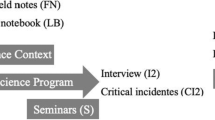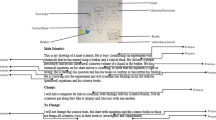Abstract
To promote the use of scientific inquiry methods in K-12 classrooms, departments of teacher education must provide science teachers with experiences using such methods. To comply with state and national mandates, an apprenticeship course was designed to afford preservice secondary science teachers opportunities to engage in an authentic, extended, open-ended inquiry. This study describes three teachers’ apprenticeship experiences with a research scientist. Our model included placing preservice teachers with scientists in expert/novice roles where each teacher would be actively engaged in constructing knowledge. From triangulating interview, laboratory notebook, and reflective summary data resources, we identified common themes from re-occurring statements. Findings indicated that participants acquired scientific skills and content knowledge; however, they expressed limited use of these in their classrooms.
Similar content being viewed by others
References
American Association for the Advancement of Science. (1990). Science for all Americans. New York: Oxford University Press, Inc.
American Association for the Advancement of Science. (1993). Benchmarks for science literacy. New York: Oxford University Press, Inc.
Banilower, E. R. (2002). 2000 National Survey of Science and Mathematics Education: Status of High School Physics Teaching. [Data file]. Available from the Horizon Research Inc., Web site: http://2000survey.horizon-research.com/reports/high_physics.php.
Bazler, J. A. (1991). A middle school teacher summer research project. School Science and Mathematics, 91(7), 322–324.
Boser, J., Faires, C., Slawson, W., & Stevenson, W. (1988). The effect of active research involvement on secondary science and mathematics teachers. ERIC Document No. 303–338.
Brown, J. S., Collins, A., & Duguid, P. (1989). Situated cognition and the culture of learning. Educational Researcher, 18(1), 32–42.
Duggan-Haas, D. (1998, April). Two programs, two cultures: The dichotomy of science teacher preparation. Paper presented at the annual meeting of the American Educational Research Association, San Diego, CA.
Duggan-Haas, D., Moscovici, H., McNulty, B., Gilmer, P. J., Eick, C. J., & Wilson, J. (2003, March). Symbiosis on campus: Collaborations of scientists and science educators. Paper presented at the annual meeting of the National Association for Research in Science Teaching, Philadelphia, PA.
Duit R., & Treagust D. (1998). Learning in science-from behaviorism towards social constructivism and beyond. In B. J. Fraser & K. Tobin (Eds.), International Handbook of Science Education. (pp. 3–25). Great Britain: Kluwer Academic Publishers.
Erickson, F. (1986). Qualitative methods in research on teaching. In M. C. Wittrock (Ed.), Handbook of research on teaching. (3rd ed., pp. 119–161). New York: Macmillan.
Farnham-Diggory, S. (1994). Paradigms of knowledge and instruction. Review of Educational Research, 64(3), 463–477.
Gilmer, P. (1997, March). Teachers learning science by doing science. Paper presented at the annual meeting of the National Association for Research in Science Teaching, Oak Brook, IL.
Gilmer, P. J., Hahn, L. L., & Spaid, R. M. (Eds.). (2002). Experiential learning for per- service science and mathematics teachers: Applications to secondary classrooms. Tallahassee, FL: SERVE.
Gottfried, S. S. (1993, April). A formative evaluation of scientific work experience program for science teachers. Paper presented at the meeting of the National Association for Research in Science Teaching, Atlanta, GA.
Govett, A. L., & Hemler, D. A. (2002, January). Changing teachers’ attitudes and perceptions of science and scientific research. Paper Presented at the meeting of the Association for the Education of Teachers in Science, Charlotte, NC.
Granger, C. R. (2002). Student and teachers as research scientists (STARS). Retrieved April 28, 2005, from University of Missouri-St. Louis, Science Education Program Web site: http://www.biologie.uni-hamburg.de/bonline/ibc99/missouri/stars.htm.
Hemler, D. A. (1997). Research experiences in teaching preparation: Effectiveness of the green bank preservice teacher enhancement program. (Doctoral dissertation, West Virginia University, 1997). Dissertation Abstracts International, 58, 07A.
Melear, C. T., Goodlaxson, J. D., Warne, T. R., & Hickok, L. G. (2000). Teaching preservice science teachers how to do science: Responses to the research experience. Journal of Science Teacher Education, 11(1), 77–90.
National Research Council. (1996). National science education standards. Washington DC: National Academy Press.
National Science Teachers Association, NSTA. (2003). Standards for Science Teacher Preparation 2003 [Data file]. Available from the National Science Teachers Association Web site: http://www.nsta.org/main/pdfs/NSTAstandards2003.pdf.
Piaget, J. (1951). The child’s conception of physical causality. London: Routledge & Kegan Paul.
Pyle, E. J., Obenauf, P., Heatherly, S. A., DiBiase, W., Hemler, D., Govett, A., et al. (1997, January). The impact of the teacher research experience learning “real” science in a “real” context. Paper presented at the meeting of the Association for the Education of Teachers in Science, Cincinnati, OH.
Raphael, R., Tobias, S., & Greenberg, R. (1999). Research experience as a component of science and mathematics teacher preparation. Journal of Science Teacher Education 10(2), 147–158.
Roth, W.-M. (1995). Authentic school science: Knowing and learning in open-inquiry science laboratories. Boston, MA: Kluwer Academic Publishers.
Roth, W.-M. (1998). How prepared are preservice teachers to teach scientific inquiry? Levels of performance in scientific representation practices. Journal of Science Teacher Education, 9(1), 25–48.
Roth, W.-M., Tobin, K. (2002). At the elbow of another: Learning to teach by coteaching. New York, NY: Peter Lang Publishing.
Salish I Research Collaborative. (1997). Secondary science and mathematics teacher preparation programs: Influences on new teachers and their students. Iowa City, IA: Science Education Center, University of Iowa.
Schwartz, R. S., Lederman, N. G., & Crawford, B. (2000). Making connections between the nature of science and scientific inquiry: A science research internship for preservice teachers. Paper presented at the meeting of the Association for the Education of Teachers in Science, Akron, OH.
Science Teachers Research Involvement for Vital Education (STRIVE). (n.d.). Retrieved April 28, 2005, from University of Arkansas Little Rock’s Program Web site: http://www.ualr.edu/%7Estrive/.
Smith, P. S. (2002). 2000 National Survey of Science and Mathematics Education: Status of High School Chemistry Teaching. [Data file]. Available from the Horizon Research Inc., Web site: http://2000survey.horizon-research.com/reports/high_chemistry.php.
Snow, C. P. (1998). The two cultures. United Kingdom: Cambridge University Press.
Spiegel, S. A., Collins, A., & Gilmer, P. J. (1995). Science for early adolescence teachers (Science FEAT): A program for research and learning. Journal of Science Teacher Education, 6(4), 165–174.
Stepans, S., & McCormack, A. (1985, October). A study of scientific conceptions and attitudes toward science of prospective elementary teachers: A research project. Paper presented at the meeting of the Northern Rocky Mountain Educational Research Association, Jackson Hole, WY.
Tennessee Department of Education. (1997). Tennessee Licensure Standards and Induction Guidelines. Retrieved April 28, 2005, from Tennessee Department of Educations’ Web site: http://www.state.tn.us/education/accttchlicstds.pdf.
Thorndike, E. L. (1913–1914). Educational psychology (Vols. 1–3). New York: Teachers College Press.
Strauss, A., & Corbin, J. (1998). Basics of qualitative research: Techniques and procedure for developing grounded theory. (2nd ed.). Thousand Oaks, CA: Sage Publications.
Vygotsky, L. S. (1978). Mind in society: The development of higher psychological processes. Cambridge, MA: Harvard University Press.
Weiss, I. R. (2002). 2000 National Survey of Science and Mathematics Education: Status of Secondary School Earth Science Teaching. [Data file]. Available from the Horizon Research Inc., Web site: http://2000survey.horizon-research.com/reports/sec_earthscience.php.
Westerlund, J. F., Garcia, D. M., Koke, J. R., Taylor, T. A., & Mason, D. S. (2002). Summer scientific research for teachers: The experience and its effect. Journal of Science Teacher Education, 13(1), 63–83.
Westerlund, J. F., Schwartz, R. S., Lederman, N. G., & Koke, J. R. (2001). Teachers learning about nature of science in authentic science contexts: Models of inquiry and reflection. Paper presented at the meeting of the National Association for Research in Science Teaching, St. Louis, MO.
Wood, K. D. (2002). 2000 National Survey of Science and Mathematics Education: Status of High School Biology Teaching. [Data file]. Available from the Horizon Research Inc., Web site: http://2000survey.horizon-research.com/reports/high_biology.php.
Author information
Authors and Affiliations
Corresponding author
About this article
Cite this article
Brown, S., Melear, C. Preservice Teachers’ Research Experiences in Scientists’ Laboratories. J Sci Teacher Educ 18, 573–597 (2007). https://doi.org/10.1007/s10972-007-9044-9
Published:
Issue Date:
DOI: https://doi.org/10.1007/s10972-007-9044-9




